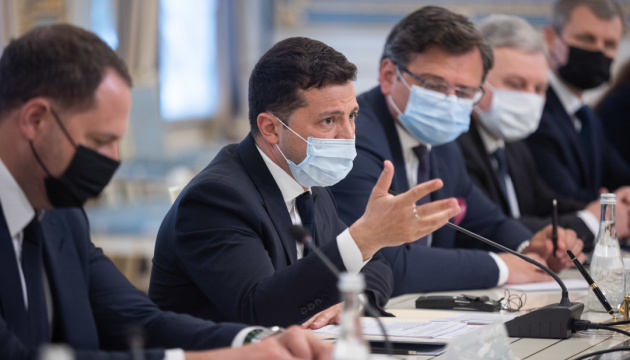The Trump Doctrine And Ukraine's NATO Prospects: A Critical Review

Table of Contents
The Trump administration's foreign policy, often referred to as the "Trump Doctrine," profoundly reshaped the international landscape. This article critically examines this doctrine's impact on Ukraine's longstanding aspirations to join NATO, analyzing its consequences for transatlantic security and the broader geopolitical context. We will explore how Trump's actions and pronouncements affected Ukraine's security and its prospects for alliance membership, leaving a lasting impact on the future of the region.
The Trump Doctrine's Core Tenets and their Implications for Ukraine
America First and its effect on alliances
The "America First" approach prioritized national interests above traditional alliances, significantly impacting the US commitment to NATO and support for Ukraine. This "America First" policy manifested in several key actions:
- Withdrawal from the Trans-Pacific Partnership (TPP): This signaled a retreat from multilateral agreements and a focus on bilateral deals.
- Renegotiation of NAFTA: This demonstrated a willingness to prioritize domestic interests over established trade relationships.
- Public questioning of NATO's value: Trump frequently questioned the value of NATO, suggesting that the US might withdraw its support unless member states increased their financial contributions.
This ambiguity undermined Ukraine's security guarantees and NATO's credibility as a deterrent to Russian aggression. The lack of a clear, unwavering commitment from the US left Ukraine vulnerable and fueled doubts about the alliance's resolve.
Transactional Diplomacy and its impact on Ukraine's relationship with the US
Trump's transactional approach to foreign policy deeply affected US-Ukraine relations. This approach was characterized by:
- Conditional aid: US aid to Ukraine was often presented as conditional, creating uncertainty and potentially undermining Ukraine's ability to defend itself.
- Public questioning of US aid to Ukraine: Trump publicly questioned the rationale behind US aid to Ukraine, creating an impression of wavering support.
- Perceived closeness to Russia: Trump's apparent reluctance to criticize Russia and his positive interactions with Vladimir Putin fueled concerns in Ukraine about a potential shift in US policy towards a more accommodating stance towards Russia.
This weakened Ukraine's leverage in its dealings with Russia and potentially emboldened Moscow. The perceived lack of consistent US support emboldened Russia to continue its aggressive actions against Ukraine.
Russia's Actions and the Weakening of NATO's Deterrent Effect
Russian aggression in Crimea and Donbas during the Trump administration
Russia's aggression in Ukraine continued unabated throughout the Trump presidency, with limited strong US responses:
- Annexation of Crimea: Russia's annexation of Crimea in 2014 remained unchallenged throughout the Trump administration, a move that solidified Russia's violation of international law and Ukraine's territorial integrity.
- Support for separatists in Donbas: Russia continued to provide support to separatist groups in eastern Ukraine, prolonging the conflict and destabilizing the region.
- Cyberattacks: Ukraine faced numerous cyberattacks attributed to Russia, disrupting critical infrastructure and undermining national security.
The Trump administration's response (or perceived lack thereof) to these actions affected NATO's collective security assurances and diminished Ukraine's trust in its Western allies. The wavering commitment to Ukraine's defense weakened NATO's deterrent effect against further Russian aggression.
Impact on NATO cohesion and decision-making
The Trump administration's policies significantly affected NATO's internal cohesion and its ability to respond effectively to Russian aggression:
- Public criticism of NATO allies: Trump frequently criticized NATO allies for not meeting their financial commitments, undermining the alliance's unity and purpose.
- Questioning of financial contributions: Trump's constant questioning of financial contributions from NATO members sowed discord and uncertainty within the alliance.
- Reluctance to engage in collective action: The Trump administration showed a reluctance to engage in decisive collective action against Russia, further weakening NATO's deterrent power.
This internal division significantly weakened NATO's deterrent effect, making Ukraine's NATO prospects even more uncertain.
Long-Term Consequences for Ukraine's NATO Aspirations
Shift in the geopolitical landscape
The Trump Doctrine's legacy has profoundly shifted the geopolitical landscape in Eastern Europe and significantly impacted Ukraine's security:
- Increased Russian assertiveness: Russia's emboldened assertiveness in the region, fueled by the perceived weakness of the West under the Trump administration, poses a serious threat to Ukraine's sovereignty.
- Challenges to the rules-based international order: The Trump administration's approach undermined the rules-based international order, creating a more unpredictable and volatile environment.
- Uncertainty about US commitment to European security: The ambiguity surrounding US commitment to European security following the Trump era created uncertainty and anxiety amongst Ukraine and its allies.
These changes directly impacted Ukraine's ability to secure its independence and pursue its NATO aspirations.
The future of US-Ukraine relations and NATO membership
The current state of US-Ukraine relations and the prospects for Ukraine's eventual NATO membership are complex and depend on several factors:
- Biden administration's approach: The Biden administration has taken a more supportive stance towards Ukraine and reaffirmed the US commitment to NATO.
- Continued US military and financial assistance to Ukraine: The US continues to provide significant military and financial assistance to Ukraine, demonstrating a commitment to Ukraine's security.
- Ongoing debate within NATO about expansion: The debate on NATO expansion continues, with differing opinions amongst member states on Ukraine's membership.
Ukraine faces considerable challenges in its pursuit of NATO membership, but continued Western support and a strengthened transatlantic alliance offer some hope for eventual accession.
Conclusion
The Trump Doctrine's impact on Ukraine's NATO prospects was profound and multifaceted. The "America First" approach, transactional diplomacy, and ambiguous responses to Russian aggression created a period of uncertainty and weakened the transatlantic alliance's deterrent effect. While the Biden administration has worked to repair some damage, the Trump Doctrine's legacy continues to affect Ukraine's security and its NATO aspirations. Further research is crucial to understanding the long-term consequences and how Ukraine can overcome these challenges to secure its future within a strong, united transatlantic security architecture. Understanding the full implications of the Trump Doctrine and its effects on Ukraine's NATO prospects is essential for navigating future geopolitical challenges.

Featured Posts
-
 Selling Sunset Star Highlights Post Fire Landlord Price Gouging In La
Apr 26, 2025
Selling Sunset Star Highlights Post Fire Landlord Price Gouging In La
Apr 26, 2025 -
 Preordering Nintendo Switch 2 The Game Stop Experience
Apr 26, 2025
Preordering Nintendo Switch 2 The Game Stop Experience
Apr 26, 2025 -
 Mission Impossible 7 Svalbard Filming Locations And Bts Footage
Apr 26, 2025
Mission Impossible 7 Svalbard Filming Locations And Bts Footage
Apr 26, 2025 -
 Middle Managements Impact Driving Results For Companies And Individuals
Apr 26, 2025
Middle Managements Impact Driving Results For Companies And Individuals
Apr 26, 2025 -
 A Detailed Look At Dave Portnoys Criticism Of Gavin Newsom
Apr 26, 2025
A Detailed Look At Dave Portnoys Criticism Of Gavin Newsom
Apr 26, 2025
Latest Posts
-
 Celebrity Style Evolution Ariana Grandes Professional Hair And Tattoo Makeover
Apr 27, 2025
Celebrity Style Evolution Ariana Grandes Professional Hair And Tattoo Makeover
Apr 27, 2025 -
 The Professionals Behind Ariana Grandes Dramatic Hair And Tattoo Change
Apr 27, 2025
The Professionals Behind Ariana Grandes Dramatic Hair And Tattoo Change
Apr 27, 2025 -
 Ariana Grandes Hair And Tattoo Transformation Professional Insights Into Celebrity Styling
Apr 27, 2025
Ariana Grandes Hair And Tattoo Transformation Professional Insights Into Celebrity Styling
Apr 27, 2025 -
 Understanding Ariana Grandes Style Evolution The Role Of Professional Hair And Tattoo Experts
Apr 27, 2025
Understanding Ariana Grandes Style Evolution The Role Of Professional Hair And Tattoo Experts
Apr 27, 2025 -
 Ariana Grandes Bold New Look Exploring The Professionalism Behind Her Hair And Tattoo Choices
Apr 27, 2025
Ariana Grandes Bold New Look Exploring The Professionalism Behind Her Hair And Tattoo Choices
Apr 27, 2025
